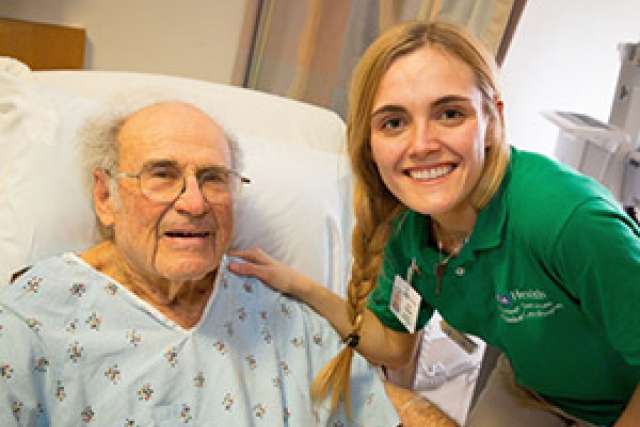Fridays are Julia Torrano’s favorite day of the week. There’s the TGIF thing, of course, but that’s not the main reason. What she enjoys most is her weekly, four-hour volunteer shift visiting older patients as part of the Companion Care Program at UCLA Health - Santa Monica Medical Center.
There, she enjoys spending time with patients who have few – if any – visitors, helping to ease the loneliness and isolation that can accompany hospital stays.
I love talking to these older patients who share their wisdom and life experiences,” explains Torrano, a 24-year-old from Santa Monica who’s planning to attend medical school.
According to Valerie Yeo, RN, director of the hospital’s inpatient Geriatrics Unit, volunteers like Torrano are important because many elderly patients feel very isolated. Some don’t have family in the area, while others’ family members are unable to spend much time at the hospital because of work or other commitments.
“Hospitalization is never fun, but for patients who don’t have visitors, it can be very lonely,” said Yeo.
That’s one reason the UCLA Geriatrics Program launched its Companion Care Program at the hospital a year ago. The program now provides 45 companions, with a goal of having 200 volunteers who can donate at least one four-hour shift each week.
Yeo said poor nutrition and feelings of loneliness, depression and isolation are prevalent in the geriatric population, and the program seeks to counter these and reduce patient stress by providing one-on-one companionship, assistance and access to activities. These companions, identifiable by their bright green polo shirts, often read to patients, play games with them, assist with feeding and perform other tasks, such as accompanying patients on walks under a nurse’s supervision.
David Reuben, MD, chief of the UCLA Geriatrics Program in Santa Monica and Westwood, said companions also help interested patients tell their life story through the “Living History Program,” a process designed to improve the connection between caregivers and patients by encouraging patients to share life experiences.
“Volunteers provide individualized social interaction and attention – engaging patients in a more personal way than might otherwise be possible. Most of the patients on the unit are sick, and a significant number have dementia, so levels of ability to participate in activities will vary,” Reuben said. He added that volunteers must acquire CPR certification, receive specialized training in the needs and care of the geriatric population and attend a two-hour orientation program. Even with their training and skills, volunteers are not assigned to high-risk patients.
Lonely patients aren’t the only beneficiaries of companion care, according to Pedro Jimenez, program manager.
“Sometimes volunteers are assigned to patients who actually do have family members and friends, but those visitors may need a break – maybe just an hour to grab lunch or run home and take a shower,” Jimenez said. “They may be reluctant to leave their loved one even for that amount of time. A volunteer can step in and provide a bit of respite.”
As important as the program is to the patients, Torrano feels that it also has a positive impact on her own life.
“This is the most rewarding volunteer program in which I’ve ever participated,” she said. “Most of the patients just crave talking to people. They love talking about their lives, and I love hearing about them. For example, I was sitting one day with an older gentleman who had no family, and he began talking about his passion for music and ballroom dancing. He explained that it had gotten him through a divorce and other bumpy patches in his life. He was so enthusiastic and animated that it got me wanting to learn ballroom dancing, myself.”
The Companion Care Program is currently available only at UCLA’s Santa Monica campus. Anyone interested in volunteering may learn more by contacting Jimenez at 310-351-2527, emailing him at [email protected] or visiting http://geronet.ucla.edu/companioncare.



